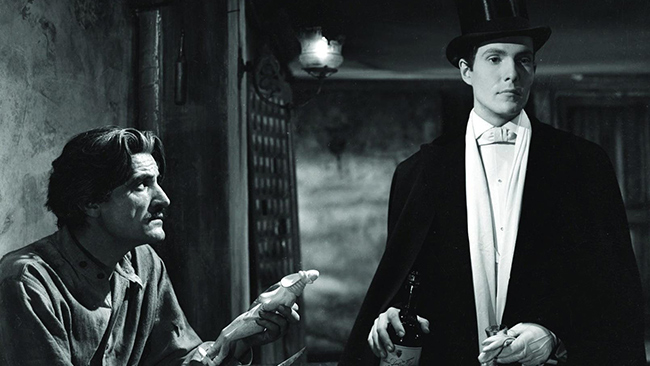
THE PICTURE OF DORIAN GRAY
ALBERT LEWIN | USA | 1945 | 110 MIN | NR
Take a Picture — It’ll Last Longer?
Unlike Dorian Gray’s famously deteriorating likeness, the pioneering portraits of 19th Century inventor and photographer Robert Cornelius have stood the test of time. Rachel Wetzel, Senior Photograph Conservator at the Conservation Center for Art and Historic Artifacts, discusses the scientific breakthroughs and artistic achievements of innovators like Cornelius (who took the first “selfie” in Philadelphia in 1839), and how conservators are working to ensure that these visages never fade from view.
Arguably the definitive cinematic treatment of Oscar Wilde’s classic novel, Albert Lewin’s haunting drama follow the tragic downward spiral of Dorian Gray (Hurd Hatfield), a handsome, innocent young man corrupted by relentless hedonism. Determined to wring maximum pleasure out of life, Dorian barters his soul for eternal youth. After callously seduces and breaking the heart of an innocent young woman (Angela Lansbury), he gives himself over to a life of crime and carousing. But while Dorian’s outward appearance remains unchanged, his life-sized portrait grows increasingly monstrous in proportion to the hideousness of his soul. Remembered for its striking art direction and brilliant combination of black-and-white and Technicolor cinematography, THE PICTURE OF DORIAN GRAY breathes vivid life into Wilde’s terrifying cautionary tale.
Cast: George Sanders, Hurd Hatfield, Donna Reed, Angela Lansbury
About the Speaker:
Rachel K Wetzel joined the staff at the Conservation Center for Art and Historic Artifacts in 2007 where she currently holds the position of Senior Photograph Conservator. Prior to coming to Philadelphia, she completed the Andrew W. Mellon funded, post-graduate Advanced Residency Program in Photograph Conservation at the George Eastman Museum and the Image Permanence Institute in Rochester, New York (2007). She holds a Masters of Arts degree in Art Conservation from the State University of New York, Buffalo State College (2005) and a Bachelors of Art from the University of Pittsburgh (1997), where she majored in the History of Art & Architecture. Rachel is a 2016 recipient of a National Endowment for the Humanities Research and Development Grant to create a searchable, online catalog of the collective works of pioneering daguerreotypist Robert Cornelius. Rachel has been an educator of photograph conservation and preservation for the last 14 years and has taught courses, workshops and webinars across the United States. Her previous employers include the Library of Congress (Washington, DC) and the private conservation labs of Heugh-Edmondson Conservation (Kansas City, MO) and Paul Messier, LLC (Boston, MA)
The Science on Screen® program pairs screenings of classic, cult, science fiction, and documentary films with lively presentations by notable experts from the world of science and technology. Each film is used as a jumping-off point for a speaker to introduce current research or technological advances in a manner that engages audiences of all backgrounds.
Science on Screen is an initiative of the Coolidge Corner Theatre, with major support from the Alfred P. Sloan Foundation.